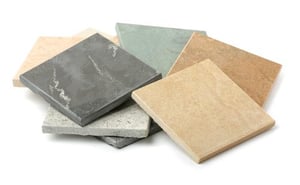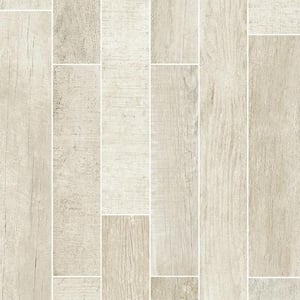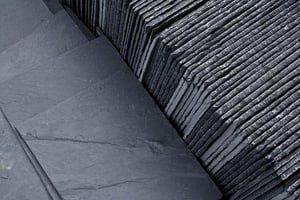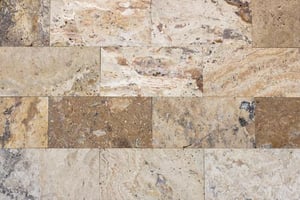How To Choose From 7 Key Types Of Tile For Your Business
Jay Goldberg 1 Comment
When choosing flooring for a commercial building, you want to consider the look, feel, and traffic of the environment. For many spaces, tile is a good solution to ensure durability and easy maintenance while offering a number of design and style options.
But what type of tile is best for your business space? How do you choose the right tile for your commercial flooring?
How To Choose Tile
You want to choose the right tile for your building—but how do you know what will hold up the best? There are 9 considerations when choosing the type of tile for your commercial space.
Remember: A strong business starts with a good first impression. A good first impression starts with the floors in your building.
1. Durability
One of the most important considerations for commercial spaces is durability and water-resistance. How will the floor tiles stand up against traffic? How will these floors hold up in moisture-rich areas?
A durable tile can help enhance the longevity of your floors and be easier to maintain long-term. Durable floors are more resistant to scratches, stains, and marks, making it easier to provide beautiful flooring for employees and customers. Durable tiles are especially important in high-traffic areas like entryways, lobbies, and bathrooms.
You can tell the durability of tile by looking at the PEI scale. On a scale of 1 to 5, PEI 1 is least durable and PEI 5 is the most resistant. For commercial settings, we recommend a PEI 3 or above. PEI 3 can work for moderate foot traffic, like office spaces and conference rooms. PEI 4 and 5 are best for medium to heavy traffic like corridors, lobbies, bathrooms, kitchens, entrances, and highly visited areas.
The most durable types of tile are usually porcelain and slate.
2. Safety
In a commercial setting, you want to consider the safety of the flooring you’re putting in your building. Different floors have different textures, which can impact the traction underfoot.
For example, marble and glazed ceramic tile can be slippery when wet. Thus, these may not be suitable for entrances where people might track in rain and snow. If you want to use these tiles in high-traffic areas, though, using floor mats can help keep people from slipping. Learn more about the use of floor mats here.
Any sort of textured tile is the safest type of flooring. This includes vinyl tile, unglazed ceramic, textured porcelain, and coarse natural stone. You may also want to consider applying a non-slip sealant atop any floor surface.
3. Design
The floors should match the style and décor of the room. This includes style, color, and appearance.
We usually recommend not following floor trends. Although they look nice at the time, trends are constantly changing. This means you’ll often have to change your floors or risk going “out of style.”
Thus, we recommend focusing instead on choosing floors that reflect your business’s personality. For example, an eco-friendly company might want wood-look tiles or stone tiles for an earthy, natural feel. A high-end law firm may want marble entryways for a luxurious ambiance.
Keep in mind that floors can also impact the sound level of a room. For example, some floors like cork or wood will actually absorb sound to create a quieter environment. Porcelain and ceramic tiles can reflect sound and create a more ambient atmosphere.
We love tiles for commercial settings because tiling can be so versatile. Most tiles come in a variety of looks and styles to best suit your needs.
4. Color
Along with design, you want to pick the color based on the feel of the room. Lighter colors make a space appear larger and brighter, but they take a higher level of maintenance. Darker colors add warmth and comfort, and they’re usually easier to clean and hide stains. Neutral colors are great for any décor, especially if you change the style and feel of the room often.
For high-traffic areas, we recommend choosing tiles with shade variations. This means that there are a variety of light and dark shades. This creates a striking look while also best masking stains, scratches, and marks from high volume foot traffic.
5. Texture
The texture of the floor influences the design and safety. A matte or rough surface is usually better for commercial spaces than shiny, slippery floors. This can also create an attractive look for any décor. If you want a clean, smooth look, consider a non-textured floor with slip-resistant sealer.
6. Size
Choose the size based on the look of the room. Smaller tiles can create a more striking and eye-catching look, while larger tiles can create a smooth flow throughout the room.
Like design, tile sizes can vary drastically. You can have tiles ranging from tiny mosaics sized .5”x.5” up to large porcelain panels 5’x10’. Generally, the most common tile floor size is 13”x13”.
We love tiles because you can find just about any size for your space. Some tiling companies can also cut down tiles to fit your needs accordingly. Certain styles and materials work better with certain sizes, so be sure to consult with a professional regarding the look of your room.
7. Maintenance
You want floors that are easy to clean and upkeep, especially in commercial spaces. Maintenance increases the lifespan of your floors, which decreases flooring removal and installation costs. Regular cleaning also helps maintain the beauty of the floor to impress employees and clients.
Choose a floor that is easy to maintain so your janitorial crew has a simple, safe job. Overall, tile is one of the easiest types of flooring to maintain. Ceramic, porcelain, and marble are especially cleanable.
Find tile cleaning products here.
8. Price
You need to choose a tile that works best with your budget. Here are some example costs for standard tiling options:
- Ceramic tiles are approximately $5-$14 per square foot.
- Porcelain tiles range from $3 to $10 per square foot.
- Natural stone varies, but it can average $6 to $15 per square foot.
- Small mosaic tiles can be $17-$32 per square foot.
You’ll also want to consider installation costs. Generally, the size of the tile and the necessary labor will impact the cost of installation. For example, small mosaic tiles take more detail, so installation tends to be pricier than large stone or vinyl tiles.
9. Grout
You want to match the grout to the tiles for a consistent look. Grout is the sealer that keeps tiles attached to one another and the subflooring.
You want a strong adhesive that won’t deteriorate over time. You also want a grout that matches with your floors. We recommend choosing a grout that has the same color scheme as your tile. You can also choose an opposing color for a striking and vibrant contrast.
Keep in mind that dirty grout instantly makes your floors look unmaintained. This is especially important as moist, small areas in the grout can breed bacteria like mold and mildew.
Teach your team how to properly clean in-between tiles to keep grout spotless and bacteria-free.
7 Major Types Of Commercial Tiles
Now that you know what you should be looking for when choosing a tile, what are the types of tiles you’ll want to choose from? What are benefits and uses of each type of tile?
Ceramic Tile
Ceramic is a mixture of clays pressed together and heated at high temperatures. Ceramic can be glazed or unglazed, and it’s ideal for commercial tiles because of its durability and versatility. It also doesn’t fade in direct sunlight, which makes it a good option for outdoor spaces as well.
Unglazed ceramic may be porous and unable to resist moisture—which you usually don’t want in high-traffic areas. However, unglazed tile is a prime candidate for waterproofing sealants, which you can easily apply for a moisture-proof floor.
Glazed ceramic is non-porous and holds up well against water. It’s durable and usually resistant to stains, scratches, and fire. It’s highly durable and holds up well against water. However, some cheaper glazed ceramic can scratch over time.
The only drawback to ceramic is that low-quality tiles will chip over time, and it can be a challenge to clean the grout in between ceramic tiles.
Porcelain Tile
Porcelain tiles are made from finer clays like quartz and feldspar. They’re pressed at higher temperatures, which makes porcelain stronger and more durable than ceramic.
Porcelain can withstand just about any scratches or wear and tear that comes its way. It’s also highly resistant to moisture and frost, making it great for entryways and lobbies. Porcelain is also non-porous and nearly impervious to spills, so it’s a strong option for kitchens and bathrooms.
We often recommend porcelain because of its durability, safety, and versatility. It comes in a variety of finishes and sizes, and it can even be made to imitate natural stone or slate.
Most porcelain will not chip or scratch. However, we recommend getting porcelain tile that is the same color throughout, so it’s less noticeable if it gets dented or scratched over time.
Marble Tiles
Marble is a type of natural stone tile that’s highly durable and versatile. These give a luxurious, stunning look to any room. They’re especially used in lobbies or large conference rooms.
Moreover, marble is easy to clean and maintain. It requires daily maintenance, but a simple mopping does the trick. Marble tiles generally come in 12”x12” tiles, which makes it easy to install as well.
However, marble can be expensive. It’s also not impervious to all stains, so we don’t recommend using marble tiles in high-use areas, like kitchens or offices. You’ll also want to seal marble on a regular basis to keep it shiny and fresh.
Slate Tiles
Slate is a fine-grain stone made from shale and clay. It’s transformed by heat and pressure, which makes it dense and durable. Slate has a naturally textured, slip-resistant surface, which makes it safe for highly tread areas. We especially love slate’s dark, earthy tones that make it a stunning natural stone for any décor.
Slate can be challenging to clean, and it’s not very resistant to water. It’s not recommended for high moisture areas.
Granite Tiles
Granite is harder and denser than other natural stones, which makes it a viable solution for high traffic areas. It’s available in thousands of colors, and we love the speckled minerals and veining in each tile. Once polished, it resists scratching well. Granite can be expensive, so we usually recommend it for distinctive rooms.
Limestone Tiles
Limestone gives an earthy appearance that works especially well for spaces with a natural, eco-friendly vibe. It can come in a variety of light and dark shades as well as rough or smooth texture.
Limestone is less dense than granite or marble, making it prone to scratching. Thus, we don’t recommend it for high-traffic flooring.
Travertine Tiles
Travertine is a natural stone that’s popular in the southwest. Made from limestone, it gives a light, clean look in a variety of earthy colors. It has a crystallized appearance that works well for airy spaces.
However, travertine is very soft and porous. It’s easily scratched and stained, and it can be hard to maintain. We often don’t recommend travertine for commercial buildings. However, we’ve included it on this list because it’s growing increasingly popular for high-end buildings to use travertine in specialty rooms as a way to add a modern, sophisticated feel.
Learn more about the pros and cons of travertine flooring with The Spruce.
Other
There are a number of other types of flooring tiles to consider as well. Vinyl tile, wood-look flooring, and metal tiles are all possibilities as well. If you’re not sure what type of tile to use for your space, contact Floorcare now for a free consult!
The Bottom Line
Choose your commercial tile based on design and durability. What do you want the room to feel like? How can you choose a tile that will help best meet the safety and traffic volume of that room?
Floor maintenance is critical for any type of tile. If you want to give your floors a long and beautiful life, regular upkeep is essential.
Stay in the know about commercial floor upkeep with Floorcare!
Follow Floorcare’s blog for tips on how to maintain and clean all types of flooring!
Product Category: Tile Cleaning
Jay Goldberg 3 comments






1 Comment